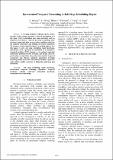| dc.contributor.author | Huang, Y. | |
| dc.contributor.author | Zheng, L. | |
| dc.contributor.author | Williams, Brian Charles | |
| dc.contributor.author | Tang, L. | |
| dc.contributor.author | Yang, H. | |
| dc.date.accessioned | 2011-10-11T21:00:40Z | |
| dc.date.available | 2011-10-11T21:00:40Z | |
| dc.date.issued | 2010-12 | |
| dc.identifier.isbn | 978-1-4244-8502-4 | |
| dc.identifier.isbn | 978-1-4244-8501-7 | |
| dc.identifier.issn | 2157-3611 | |
| dc.identifier.other | INSPEC Accession Number: 11705978 | |
| dc.identifier.uri | http://hdl.handle.net/1721.1/66211 | |
| dc.description.abstract | A working predictive schedule can be useless because of the various external or internal disruptions in a job shop. Total rescheduling may cause problems such as shop floor nervousness. Thus, the job shop scheduling repair (recovery) approach aims at generating a solution satisfying the updated constraints and making deviations minimized. We propose an incremental temporal reasoning approach in this paper to solve job shop scheduling repair problems. Specifically, such a problem is formulated as a disjunctive temporal problem (DTP), framed as an optimal constraint satisfaction problem (OCSP) formally, and finally solved by performing an algorithm integrating incremental temporal consistency and efficient candidate generation. Through involving human interactive mechanism, domain experts can make higher quality decisions by balancing makespan and deviations. | en_US |
| dc.language.iso | en_US | |
| dc.publisher | Institute of Electrical and Electronics Engineers | en_US |
| dc.relation.isversionof | http://dx.doi.org/10.1109/IEEM.2010.5674383 | en_US |
| dc.rights | Article is made available in accordance with the publisher's policy and may be subject to US copyright law. Please refer to the publisher's site for terms of use. | en_US |
| dc.source | IEEE | en_US |
| dc.title | Incremental temporal reasoning in job shop scheduling repair | en_US |
| dc.type | Article | en_US |
| dc.identifier.citation | Huang, Y. et al. “Incremental temporal reasoning in job shop scheduling repair.” Industrial Engineering and Engineering Management (IEEM), 2010 IEEE International Conference on. 2010. 1276-1280. Copyright © 2010, IEEE | en_US |
| dc.contributor.department | Massachusetts Institute of Technology. Computer Science and Artificial Intelligence Laboratory | en_US |
| dc.contributor.department | Massachusetts Institute of Technology. Department of Aeronautics and Astronautics | en_US |
| dc.contributor.approver | Williams, Brian Charles | |
| dc.contributor.mitauthor | Huang, Y. | |
| dc.contributor.mitauthor | Williams, Brian Charles | |
| dc.relation.journal | IEEE International Conference on Industrial Engineering and Engineering Management (IEEM) 2010 | en_US |
| dc.eprint.version | Final published version | en_US |
| dc.type.uri | http://purl.org/eprint/type/ConferencePaper | en_US |
| dspace.orderedauthors | Huang, Y.; Zheng, L.; Williams, Brian C.; Tang, L.; Yang, H. | en |
| dc.identifier.orcid | https://orcid.org/0000-0002-1057-3940 | |
| mit.license | PUBLISHER_POLICY | en_US |
| mit.metadata.status | Complete | |
